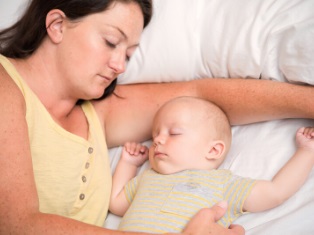Research by baby sleep experts at Durham University has led to new international guidance on bedsharing.
In the new protocol, breastfeeding mothers and babies are not advised against bedsharing, as long as no dangerous circumstances exist. This marks a departure from advice most commonly given which categorically advises against bedsharing.
The protocol has been published by the Academy of Breastfeeding Medicine, an international body of physicians, and is aimed at clinicians world-wide.
It emphasises that all parents should be educated on safe bedsharing, with the understanding that bedsharing is very common.
Dangerous circumstances include sleeping with an adult on a sofa or armchair; sleeping next to an adult impaired by alcohol, medications, or illicit drugs; tobacco exposure; and preterm birth.
The Durham Infancy & Sleep Centre has been at the forefront of infant sleep research for over 20 years. It has made a significant contribution to keeping babies safe at night, including helping to reduce the rates of Suddent Infant Death Syndrome (SIDS).
Researchers conduct studies in people’s homes, in hospitals and in our own sleep lab on campus where parents and babies can be observed during the night with cameras and via breathing, heart rate and temperature monitors.
Evidence from the research shows that breastfed babies, who share the bed with their mothers, sleep on their backs, and are naturally positioned away from pillows and things that may obstruct their airways. Breastfeeding mothers instinctively form a protective position around their baby.







